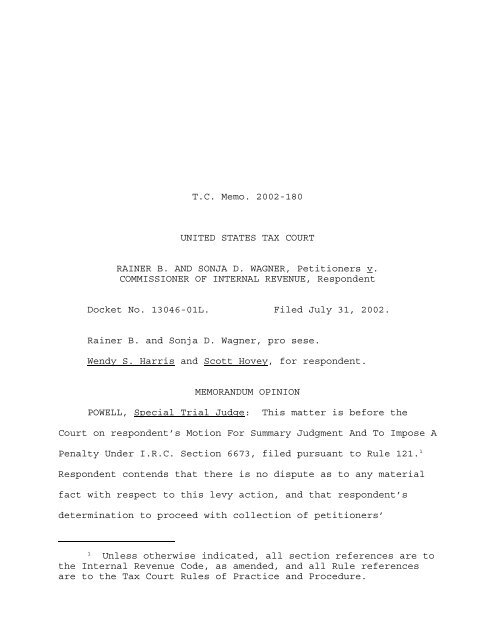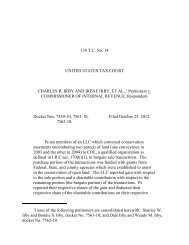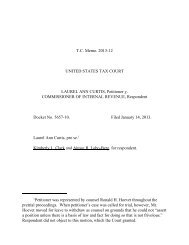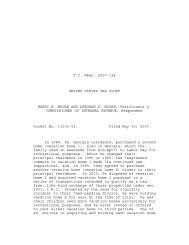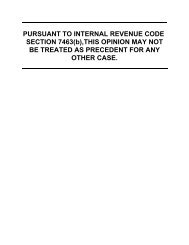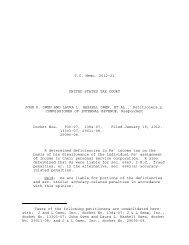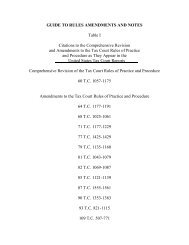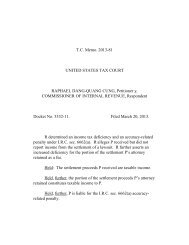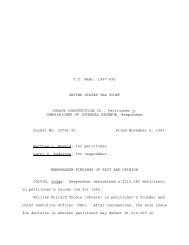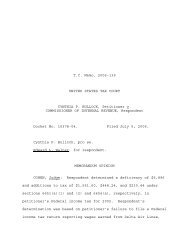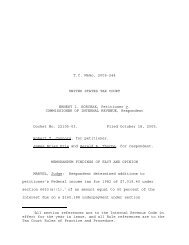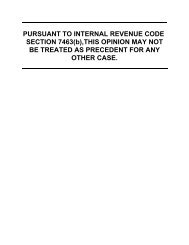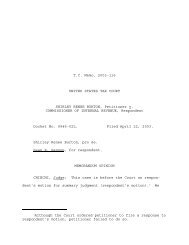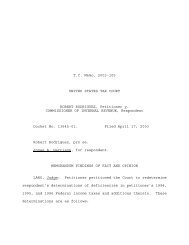Wagner v. Commissioner - U.S. Tax Court
Wagner v. Commissioner - U.S. Tax Court
Wagner v. Commissioner - U.S. Tax Court
Create successful ePaper yourself
Turn your PDF publications into a flip-book with our unique Google optimized e-Paper software.
T.C. Memo. 2002-180UNITED STATES TAX COURTRAINER B. AND SONJA D. WAGNER, Petitioners v.COMMISSIONER OF INTERNAL REVENUE, RespondentDocket No. 13046-01L. Filed July 31, 2002.Rainer B. and Sonja D. <strong>Wagner</strong>, pro sese.Wendy S. Harris and Scott Hovey, for respondent.MEMORANDUM OPINIONPOWELL, Special Trial Judge: This matter is before the<strong>Court</strong> on respondent’s Motion For Summary Judgment And To Impose APenalty Under I.R.C. Section 6673, filed pursuant to Rule 121. 1Respondent contends that there is no dispute as to any materialfact with respect to this levy action, and that respondent’sdetermination to proceed with collection of petitioners’1Unless otherwise indicated, all section references are tothe Internal Revenue Code, as amended, and all Rule referencesare to the <strong>Tax</strong> <strong>Court</strong> Rules of Practice and Procedure.
- 2 -outstanding tax liabilities for 1997 should be sustained as amatter of law.Summary judgment is intended to expedite litigation andavoid unnecessary and expensive trials. Fla. Peach Corp. v.<strong>Commissioner</strong>, 90 T.C. 678, 681 (1988). Summary judgment may begranted with respect to all or any part of the legal issues incontroversy "if the pleadings, answers to interrogatories,depositions, admissions, and any other acceptable materials,together with the affidavits, if any, show that there is nogenuine issue as to any material fact and that a decision may berendered as a matter of law." Rule 121(a) and (b); SundstrandCorp. v. <strong>Commissioner</strong>, 98 T.C. 518, 520 (1992), affd. 17 F.3d 965(7th Cir. 1994); Zaentz v. <strong>Commissioner</strong>, 90 T.C. 753, 754 (1988);Naftel v. <strong>Commissioner</strong>, 85 T.C. 527, 529 (1985). The movingparty bears the burden of proving that there is no genuine issueof material fact, and factual inferences will be read in a mannermost favorable to the party opposing summary judgment. Dahlstromv. <strong>Commissioner</strong>, 85 T.C. 812, 821 (1985); Jacklin v.<strong>Commissioner</strong>, 79 T.C. 340, 344 (1982).As explained in detail below, there is no genuine issue asto any material fact, and a decision may be rendered as a matterof law. Accordingly, we shall grant respondent’s motion forsummary judgment.
- 3 -BackgroundA. Petitioners’ Income <strong>Tax</strong> Return for 1997On or about May 7, 1998, petitioners Rainer B. and Sonja D.<strong>Wagner</strong> (petitioners) submitted to respondent a Form 1040, U.S.Individual Income <strong>Tax</strong> Return, for the taxable year 1997. Ontheir Form 1040, petitioners listed their filing status as“married filing joint return” and described their occupations as“TST 2” and “Clerk”, respectively.Petitioners entered zeros on applicable lines of the incomeportion of their Form 1040, specifically including line 7 forwages, line 22 for total income, and lines 32 and 33 for adjustedgross income. Petitioners also entered a zero on line 53 fortotal tax. Petitioners then claimed a refund in the amount of$16,149.18, which amount was equal to the Federal income tax thatpurportedly had been withheld from their wages.Petitioners attached to their Form 1040 a two-pagetypewritten statement that stated, in part, as follows:I * * * am submitting this as part of my 1997 incometax return even though I know that no section of theInternal Revenue Code:1) Establishes an income tax “liability” * * *;2) Provides that income taxes “have to be paid on thebasis of a return” * * *.3) In addition to the above, I am filing even thoughthe “Privacy Act Notice” as contained in a 1040 bookletclearly informs me that I am not required to file. Itdoes so in at least two places.a) In one place, it states that I need only file a
- 4 -return for “any tax” I may be “liable” for. Since no CodeSection makes me “liable” for income taxes, this provisionnotifies me that I do not have to file an income tax return.* * * * * * *7) Please note, that my 1997 return also constitutes aclaim for refund pursuant to Code Section 6402.8) It should also be noted that I had “zero” incomeaccording to the Supreme <strong>Court</strong>’s definition of income* * *.9) I am also putting the IRS on notice that my 1997 taxreturn and claim for refund does not constitute a“frivolous” return pursuant to Code Section 6702.* * * * * * *11) In addition, don’t notify me, that the IRS is“changing” my return, since there is no statute thatallows the IRS to do that. You might prepare a return(pursuant to Code Section 6020b), where no return isfiled, but where, as in this case, a return has beenfiled, no statute authorises (sic) IRS personnel [sic]to “change” that return.* * * * * * **NOTE #1: The word “income” is not defined in theInternal Revenue Code * * * but, as stated above, itcan only be a derivative of corporate activity. * * *B. Respondent’s Deficiency Notice and Petitioners’ ResponseOn October 8, 1999, respondent issued a joint notice ofdeficiency to petitioners. In the notice, respondent determineda deficiency of $17,765 in petitioners’ 1997 Federal income taxand an accuracy-related penalty under section 6662(a) fornegligence or disregard of rules or regulations of $323.16. Thedeficiency was based principally on respondent’s determinationthat petitioners failed to report (1) wage income of $94,701 (as
- 5 -reported to respondent on Forms W-2, Wage and <strong>Tax</strong> Statement), (2)dividend income of $32, and (3) interest income of $36.By letter dated January 2, 2000, petitioners wrote to theDirector of respondent’s Service Center in Ogden, Utah,acknowledging receipt of the notice of deficiency dated October8, 1999, but challenging the Director’s authority to send such anotice. Petitioners sent a similar letter to Charles O.Rossotti, <strong>Commissioner</strong> of Internal Revenue.Petitioners knew that they had the right to contestrespondent’s deficiency determination by filing a petition forredetermination with this <strong>Court</strong>. 2 However, petitioners chose notto do so. Accordingly, on March 27, 2000, respondent assessedthe determined deficiency and accuracy-related penalty, as wellas statutory interest.On March 27, 2000, respondent sent petitioners a noticestating that changes were made to their account, informingpetitioners that they had a tax liability for 1997, andrequesting that they pay it. Petitioners failed to do so. OnMay 1, 2000, and September 4, 2000, respondent sent petitioners2In this regard, the first sentence of petitioners’ letterdated Jan. 2, 2000, stated as follows:According to your “Deficiency Notice” of above date(cover sheet attached), there is an alleged deficiencywith respect to my 1997 income tax of $1,615.82, [sic]and if I wanted to “contest this deficiency beforemaking payment,” I must “file a petition with theUnited States <strong>Tax</strong> <strong>Court</strong>.”
- 6 -additional notices requesting that they pay the balance due for1997. Although petitioners wrote to respondent acknowledgingreceipt of each of the above-described notices, petitionersfailed to pay the amount owing.C. Respondent’s Final Notice and Petitioners’ ResponseOn October 12, 2000, respondent sent petitioners a FinalNotice-–Notice of Intent to Levy and Notice of Your Right to aHearing (the Final Notice). The Final Notice was issued inrespect of petitioners’ outstanding tax liability for 1997.On November 9, 2000, petitioners submitted to respondent aForm 12153, Request for a Collection Due Process Hearing.Petitioners requested that the Appeals Office demonstrate thatpetitioners are required to pay Federal income taxes.Petitioners also asserted that they were challenging the amountof tax listed as due in the Final Notice on the grounds that theydid not receive a valid notice and demand for payment or a validnotice of deficiency for 1997.D. The Appeals Office HearingPrior to an Appeals Office hearing, Appeals Officer RichardJ. Sigler (the Appeals officer) provided petitioners with atranscript of their account for 1997. The record in this case
- 7 -includes an IMF MCC 3 transcript of account, dated December 18,2000, regarding petitioners’ 1997 taxable year.On July 30, 2001, the Appeals officer conducted an AppealsOffice hearing that petitioner Rainer <strong>Wagner</strong> attended. Accordingto a purported transcript of the hearing prepared by petitioners,petitioner Rainer <strong>Wagner</strong> offered to pay the amount due for 1997only if the Appeals officer would show him the Internal RevenueCode provisions making petitioners liable for Federal incometaxes. The Appeals officer terminated the hearing whenpetitioner failed to raise any valid issue.E. Respondent’s Notice of DeterminationOn September 21, 2001, respondent sent petitioners a Noticeof Determination Concerning Collection Action(s) Under Section6320 and/or 6330. The notice stated that the Appeals Office haddetermined that it was appropriate for respondent to proceed withthe collection of petitioners’ outstanding tax liability for1997.F. Petitioners’ PetitionOn October 17, 2001, petitioners filed with the <strong>Court</strong> apetition for lien or levy action seeking review of respondent’snotice of determination. 4 The petition includes allegations3IMF MCC stands for “Individual Master File-MartinsburgComputing Center”.4At the time the petition was filed, petitioners resided(continued...)
- 8 -that: (1) The Appeals officer failed to obtain verification fromthe Secretary that the requirements of any applicable law oradministrative procedure were met as required under section6330(c)(1); (2) petitioners never received a notice and demandfor payment; and (3) petitioners were denied the opportunity tochallenge (a) the appropriateness of the collection action, and(b) the existence or amount of their underlying tax liability.G. Respondent’s Motion for Summary JudgmentAfter filing an answer to the petition, respondent filed aMotion For Summary Judgment And To Impose A Penalty Under I.R.C.Section 6673 asserting that there is no dispute as to a materialfact and that respondent is entitled to judgment as a matter oflaw. In particular, respondent contends that: (1) Becausepetitioners received the notice of deficiency dated October 8,1999, they cannot challenge the existence or amount of theirunderlying tax liability for 1997 in this proceeding; (2) theAppeals officer’s review of the IMF MCC transcript of accountwith regard to petitioners’ account for 1997 satisfied theverification requirement imposed under section 6330(c)(1); (3)the record shows that petitioners were issued a notice and demandfor payment; and (4) petitioners’ behavior warrants theimposition of a penalty under section 6673.4(...continued)in Las Vegas, Nev.
- 9 -Petitioners filed an objection to respondent’s motion.Thereafter, pursuant to notice, respondent’s motion was calledfor hearing at the <strong>Court</strong>'s Motions Session in Washington, D.C.DiscussionSection 6331(a) provides that if any person liable to payany tax neglects or refuses to pay such tax within 10 days afternotice and demand for payment, the Secretary is authorized tocollect such tax by levy on the person’s property. Section6331(d) provides that at least 30 days before enforcingcollection by levy on the person's property, the Secretary isobliged to provide the person with a final notice of intent tolevy, including notice of the administrative appeals available tothe person.Section 6330 generally provides that the <strong>Commissioner</strong> cannotproceed with collection by levy until the taxpayer has been givennotice and the opportunity for an administrative review of thematter (in the form of an Appeals Office hearing) and, ifdissatisfied, with judicial review of the administrativedetermination. Davis v. <strong>Commissioner</strong>, 115 T.C. 35, 37 (2000);Goza v. <strong>Commissioner</strong>, 114 T.C. 176, 179-180 (2000).Section 6330(c) provides that a person may raise collectionissues such as spousal defenses, the appropriateness of the<strong>Commissioner</strong>'s intended collection actions, and possiblealternative means of collection. Section 6330(c)(2)(B) provides
- 10 -that the existence and amount of the underlying tax liability canbe contested at an Appeals Office hearing only if the person didnot receive a notice of deficiency for the taxes in question ordid not otherwise have an earlier opportunity to dispute the taxliability. Sego v. <strong>Commissioner</strong>, 114 T.C. 604, 609 (2000); Gozav. <strong>Commissioner</strong>, supra at 180. Section 6330(d) provides forjudicial review of the administrative determination in the <strong>Tax</strong><strong>Court</strong> or a Federal District <strong>Court</strong>, as may be appropriate.A. Summary JudgmentPetitioners challenge the assessments made against them onthe ground that the notice of deficiency dated October 8, 1999,is invalid. The record, however, establishes that petitionersreceived the notice of deficiency and did not file a petition forredetermination with this <strong>Court</strong>. See sec. 6213(a). It followsthat under section 6330(c)(2)(B) petitioners are barred fromchallenging the existence or amount of their underlying taxliability in this collection review proceeding.Even if petitioners were permitted to challenge the validityof the notice of deficiency, petitioners’ argument that thenotice is invalid because respondent’s Service Center director isnot properly authorized to issue notices of deficiency isfrivolous and groundless. See Nestor v. <strong>Commissioner</strong>, 118 T.C.162, 165 (2002); Goza v. <strong>Commissioner</strong>, supra at 182-183.Further, as the <strong>Court</strong> of Appeals for the Fifth Circuit has
- 11 -remarked: "We perceive no need to refute these arguments withsomber reasoning and copious citation of precedent; to do somight suggest that these arguments have some colorable merit."Crain v. <strong>Commissioner</strong>, 737 F.2d 1417, 1417 (5th Cir. 1984).Suffice it to say that petitioners are taxpayers subject toFederal income tax, see secs. 1(a)(1), 7701(a)(1), (14), and thatcompensation for labor or services rendered constitutes incomesubject to Federal income tax under section 61(a)(1), see UnitedStates v. Romero, 640 F.2d 1014, 1016 (9th Cir. 1981).We likewise reject petitioners’ argument that the Appealsofficer failed to obtain verification from the Secretary that therequirements of all applicable laws and administrative procedureswere met as required by section 6330(c)(1). The record showsthat the Appeals officer obtained and reviewed a transcript ofaccount with regard to petitioners’ tax liability for 1997.Federal tax assessments are formally recorded on a record ofassessment. Sec. 6203. “The summary record, through supportingrecords, shall provide identification of the taxpayer, thecharacter of the liability assessed, the taxable period, ifapplicable, and the amount of the assessment.” Sec. 301.6203-1,Proced. & Admin. Regs.Section 6330(c)(1) does not require the <strong>Commissioner</strong> to relyon a particular document to satisfy the verification requirementimposed therein. See Roberts v. <strong>Commissioner</strong>, 118 T.C. 365, 371
- 12 -n.10 (2002); Weishan v. <strong>Commissioner</strong>, T.C. Memo. 2002-88; Lindseyv. <strong>Commissioner</strong>, T.C. Memo. 2002-87; Tolotti v. <strong>Commissioner</strong>,T.C. Memo. 2002-86; Duffield v. <strong>Commissioner</strong>, T.C. Memo. 2002-53;Kuglin v. <strong>Commissioner</strong>, T.C. Memo. 2002-51. In this regard, weobserve that the transcript of account on which the Appealsofficer relied contained all the information prescribed insection 301.6203-1, Proced. & Admin. Regs. See Weishan v.<strong>Commissioner</strong>, supra; Lindsey v. <strong>Commissioner</strong>, supra; Tolotti v.<strong>Commissioner</strong>, supra; Duffield v. <strong>Commissioner</strong>, supra; Kuglin v.<strong>Commissioner</strong>, supra. 5Petitioners have not alleged any irregularity in theassessment procedure that would raise a question about thevalidity of the assessments or the information contained in thetranscript of account. See Davis v. <strong>Commissioner</strong>, supra at 41;Mann v. <strong>Commissioner</strong>, T.C. Memo. 2002-48. Accordingly, we holdthat the Appeals officer satisfied the verification requirementof section 6330(c)(1). Cf. Nicklaus v. <strong>Commissioner</strong>, 117 T.C.117, 120-121 (2001).Petitioners also contend that they never received a notice5To the extent that petitioners may still be arguing thatthe Appeals officer failed to provide them with a copy of theverification, we note that sec. 6330(c)(1) does not require thatthe Appeals officer provide the taxpayer with a copy of theverification at the administrative hearing. Nestor v.<strong>Commissioner</strong>, 118 T.C. 162, 166 (2002). In any event, the recordshows that the Appeals officer provided petitioners with atranscript of account prior to the Appeals Office hearing.
- 13 -and demand for payment for 1997. The requirement that theSecretary issue a notice and demand for payment is set forth insection 6303(a), which provides in pertinent part:SEC. 6303. NOTICE AND DEMAND FOR TAX.(a) General Rule.-–Where it is not otherwise providedby this title, the Secretary shall, as soon as practicable,and within 60 days, after the making of an assessment of atax pursuant to section 6203, give notice to each personliable for the unpaid tax, stating the amount and demandingpayment thereof. * * *The record shows that respondent sent petitioners a notice ofchange to their account on the same date that respondent madeassessments against petitioners for the tax and accuracy-relatedpenalty determined in the notice of deficiency, as well as twosubsequent collection notices. We hold that these noticesconstituted notice and demand for payment within the meaning ofsection 6303(a). See, e.g., Hughes v. United States, 953 F.2d531, 536 (9th Cir. 1992); Weishan v. <strong>Commissioner</strong>, supra; seealso Hansen v. United States, 7 F.3d 137, 138 (9th Cir. 1993).Petitioners have failed to raise a spousal defense, make avalid challenge to the appropriateness of respondent’s intendedcollection action, or offer alternative means of collection.These issues are now deemed conceded. Rule 331(b)(4). In theabsence of a valid issue for review, we conclude that respondentis entitled to judgment as a matter of law sustaining the noticeof determination dated September 21, 2001.
- 14 -B. Imposition of a Penalty Under Section 6673We turn now to that part of respondent’s motion that movesfor the imposition of a penalty on petitioners under section6673.As relevant herein, section 6673(a)(1) authorizes the <strong>Tax</strong><strong>Court</strong> to require a taxpayer to pay to the United States a penaltynot in excess of $25,000 whenever it appears that proceedingshave been instituted or maintained by the taxpayer primarily fordelay or that the taxpayer's position in such proceeding isfrivolous or groundless. The <strong>Court</strong> has indicated its willingnessto impose such penalty in lien and levy cases, Pierson v.<strong>Commissioner</strong>, 115 T.C. 576, 580-581 (2000), and has in factimposed a penalty in several such cases, Roberts v. <strong>Commissioner</strong>,supra (imposing a penalty in the amount of $10,000); Newman v.<strong>Commissioner</strong>, T.C. Memo. 2002-135 (imposing a penalty in theamount of $1,000); Yacksyzn v. <strong>Commissioner</strong>, T.C. Memo. 2002-99(imposing a penalty in the amount of $1,000); Watson v.<strong>Commissioner</strong>, T.C. Memo. 2001-213 (imposing a penalty in theamount of $1,500); Davis v. <strong>Commissioner</strong>, T.C. Memo. 2001-87(imposing a penalty in the amount of $4,000).We are convinced that petitioners instituted the presentproceeding primarily for delay. In this regard, it is clear thatpetitioners regard this proceeding as nothing but a vehicle toprotest the tax laws of this country and to espouse their own
- 15 -misguided views, which we regard as frivolous and groundless. Inshort, having to deal with this matter wasted the <strong>Court</strong>'s time,as well as respondent's, and taxpayers with genuine controversiesmay have been delayed.Under the circumstances, we shall grant that part ofrespondent’s motion that moves for the imposition of a penalty inthat we shall impose a penalty of $4,000 on petitioners pursuantto section 6673(a)(1).In order to give effect to the foregoing,An appropriate order anddecision will be entered.


